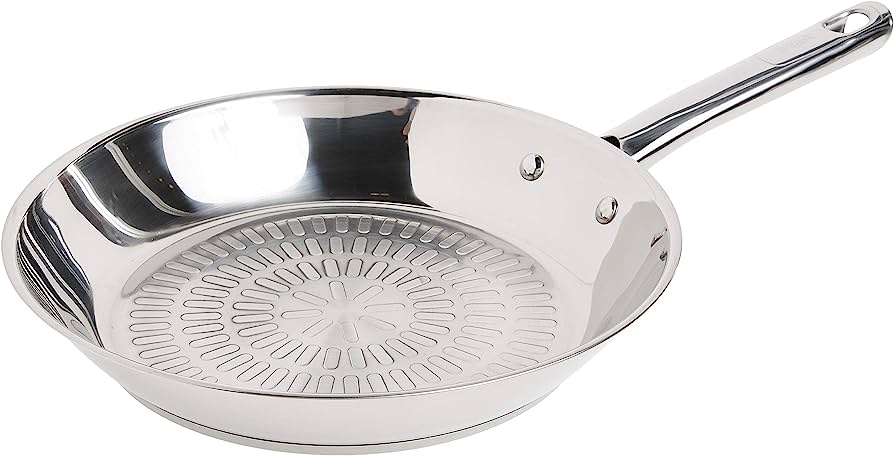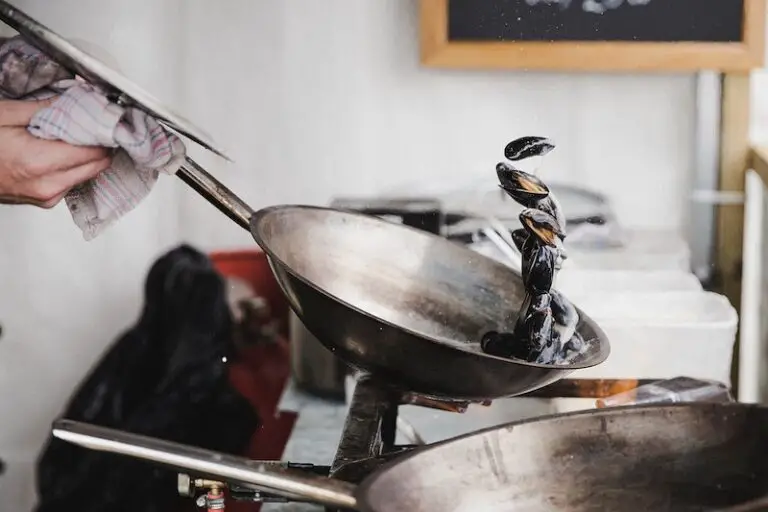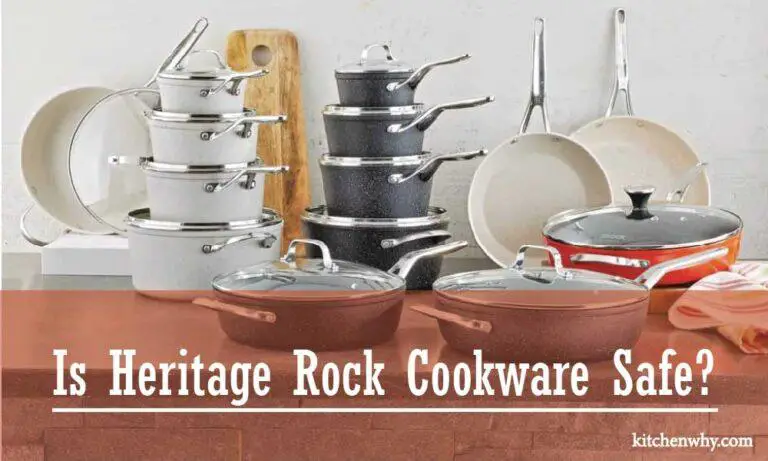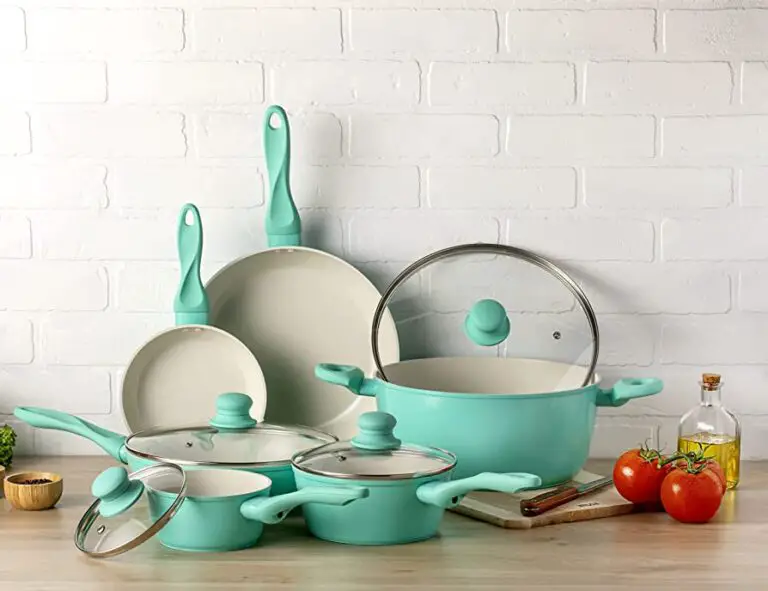Are Frying Pans Dishwashers Safe? The Surprising Truth Revealed.

Frying pans are generally not safe to put in the dishwasher due to the potential damage caused to their non-stick coating and overall quality. Frying pans are a staple in most kitchens, used for various cooking purposes.
Whether you’re whipping up a delicious omelet or searing a juicy steak, the quality and longevity of your frying pan are essential. However, when it comes to cleaning, many people wonder if it is safe to throw their frying pans in the dishwasher.
The truth is, frying pans are generally not safe to put in the dishwasher. The high heat, strong detergent, and abrasive action of the dishwasher can damage the non-stick coating and overall quality of your frying pan. In the next few paragraphs, we will explore why frying pans are not dishwasher safe and provide alternative cleaning methods to ensure the longevity of your trusty frying pan.

Credit: www.lowes.com
Understanding The Importance Of Proper Care For Frying Pans
Are Frying Pans Dishwashers Safe?
Frying pans are one of the most essential tools in any kitchen, used for a variety of cooking tasks such as sautéing, frying, and searing. To ensure their long-lasting use and maintain their performance, it is crucial to understand the importance of proper care.
Importance Of Maintaining Frying Pans For Long-Lasting Use
- Regular cleaning: Cleaning your frying pan after each use is essential to remove food residue and prevent the buildup of grease. This helps to maintain the pan’s non-stick surface and prevents it from becoming sticky or losing its effectiveness over time.
- Seasoning: Seasoning your frying pan regularly creates a natural non-stick surface and enhances its durability. By applying a thin layer of oil and allowing it to heat up, you can create a protective barrier that prevents food from sticking and also adds flavor to your dishes.
- Storage: Proper storage is crucial to maintain the condition of your frying pans. Stacking heavy items on top of your pans or allowing them to get scratched can damage their surface, affecting their performance and lifespan. It is recommended to store them in a way that prevents any potential damage.
How Improper Care Can Affect The Quality Of Your Cooking
- Loss of non-stick properties: Frying pans that are not properly cared for may start to lose their non-stick properties. This can lead to food sticking to the surface, making it difficult to cook evenly and affecting the quality of your dishes.
- Uneven heat distribution: Improper care, such as using metal utensils or abrasive scrubbing pads, can cause scratches on the surface of your frying pan. These scratches can lead to uneven heat distribution and hot spots, resulting in inconsistent cooking and potentially burned or undercooked food.
- Reduced lifespan: Neglecting proper care for your frying pans can significantly reduce their lifespan. The accumulation of grease and food residue, as well as the misuse of utensils, can cause irreversible damage that may render your pans unusable sooner than expected.
The Impact Of Dishwashers On Frying Pan Performance
- High temperatures: Dishwashers typically operate at high temperatures, which can be detrimental to the performance and longevity of your frying pans. Extreme heat can cause warping or damage to the pan’s coating, resulting in reduced cooking efficiency.
- Harsh detergents: The use of harsh detergents in dishwashers may strip away the seasoning or non-stick coating of your frying pans. This can lead to a loss of their non-stick properties, making it harder to cook and clean the pans.
- Scrubbing action: The powerful water jets and scrubbing action in dishwashers can cause scratches on the surface of your frying pans, affecting their heat distribution and overall performance.
Taking proper care of your frying pans, including avoiding dishwasher use, is essential for their long-lasting use and optimal cooking performance. By following simple maintenance steps and using gentle cleaning methods, you can ensure that your frying pans remain in excellent condition and continue to deliver delicious meals for years to come.
So, remember to handle your frying pans with care and give them the attention they deserve.
The Pros And Cons Of Dishwasher Cleaning For Frying Pans
Are Frying Pans Dishwashers Safe
Frying pans are an essential tool in every kitchen, but when it comes to cleaning, things can get a bit tricky. Many people wonder if using a dishwasher is a safe option for cleaning their frying pans. In this blog post, we will discuss the pros and cons of using a dishwasher for frying pan cleaning, shedding light on whether it is a suitable method.
Advantages Of Using A Dishwasher For Frying Pan Cleaning:
- Time-saving and convenience benefits: One of the biggest advantages of using a dishwasher to clean frying pans is the time and convenience it offers. Simply place the pan in the dishwasher, and let it do the work for you while you focus on other tasks in the kitchen.
- Effectiveness in removing tough stains: Dishwashers are known for their powerful cleaning capabilities, and this holds true for frying pans as well. The high water temperatures and strong detergents used in dishwashers can effectively remove tough stains and residue from your frying pans, saving you the effort of scrubbing them manually.
Disadvantages Of Using A Dishwasher For Frying Pan Cleaning:
- High heat and harsh detergents may cause damage: While dishwashers are effective in cleaning frying pans, the high heat and harsh detergents used in the process can potentially cause damage. High heat can warp the shape of the pan or affect the non-stick coating, while harsh detergents may strip away the pan’s seasoning or leave behind a soapy residue.
- Non-stick coating risks and concerns: If your frying pan has a non-stick coating, using a dishwasher may pose additional risks. The combination of high heat and detergents can wear down the non-stick coating over time, reducing its effectiveness and potentially exposing the food to harmful chemicals.
Using a dishwasher for frying pan cleaning has its advantages and disadvantages. It offers time-saving convenience and the ability to effectively remove tough stains. However, the risk of potential damage to the pan and non-stick coating cannot be ignored. It is important to assess the specific needs and condition of your frying pan before deciding whether to use a dishwasher for cleaning or opt for other cleaning methods.
Expert Opinions On Dishwasher Safety For Frying Pans
Frying pans are a staple in every kitchen, used to cook a wide range of delicious dishes. But when it comes to cleaning them, there seems to be some confusion about whether they can safely be placed in a dishwasher.
To shed some light on this topic, we’ve gathered insights from professional chefs, culinary experts, scientific studies, and experimentation. Here’s what they have to say:
Insights From Professional Chefs And Culinary Experts:
- Many professional chefs and culinary experts advise against washing frying pans in the dishwasher, regardless of their materials. They believe that hand washing is the best method for preserving the quality and longevity of the pan.
- The high heat and intense water pressure in dishwashers can potentially damage the nonstick coating of frying pans, leading to reduced nonstick properties and even peeling.
- Some experts suggest that the harsh detergent used in dishwashers can corrode the surface of certain materials, such as copper and cast iron, compromising their performance and durability.
Recommendations On Dishwasher Use For Specific Frying Pan Materials:
- Stainless steel frying pans are generally safe to clean in the dishwasher, but to maintain their shine and avoid potential discoloration, it is recommended to hand wash them instead.
- Nonstick frying pans are particularly sensitive to dishwasher cleaning. It is advisable to avoid dishwasher use to prevent damage to the nonstick coating.
- Cast iron and copper frying pans should never be placed in the dishwasher, as their materials can react with detergents and water, leading to rust and corrosion.
Tips For Maintaining The Quality Of Frying Pans While Using Dishwashers:
- If you choose to clean your frying pans in the dishwasher, make sure to use a gentle cycle with low temperatures to minimize the risk of damage.
- To avoid scratching or chipping, place the frying pans away from other hard objects or utensils during dishwasher cycles.
- Opt for liquid detergents specifically designed for delicate kitchenware, as they are milder and less likely to cause damage to the frying pans.
Scientific Studies And Research Findings:
- Several scientific studies have examined the effects of dishwasher cleaning on frying pans, and the consensus is that hand washing is the preferred method for maintaining their quality and durability.
- These studies have shown that frequent dishwasher use can lead to the deterioration of nonstick properties, reduced heat conductivity, and increased wear and tear of the frying pans.
- Some research has also suggested that the repeated exposure to water and heat in dishwashers can accelerate the breakdown of the materials used in frying pans, leading to a shorter lifespan.
Experimentations On The Effects Of Dishwasher Cleaning On Frying Pans:
- Experimentations have been conducted to evaluate the impact of dishwasher cycles on frying pans, with a focus on nonstick surfaces.
- The results consistently indicate that dishwasher cleaning leads to a gradual decline in the nonstick performance of frying pans.
- The nonstick coating becomes less effective in preventing food from sticking, and in some cases, it starts to peel off, rendering the frying pan less usable over time.
Analysis Of The Impact Of Dishwasher Cycles On Frying Pan Durability:
- In-depth analyses of the impact of dishwasher cycles on frying pans have revealed that the harsh detergents and high temperatures used in dishwashers contribute to the degradation of various materials, such as nonstick coatings, stainless steel finishes, and natural patina on copper pans.
- The continuous exposure to these conditions weakens the structural integrity of the frying pans, making them more susceptible to damages, warping, and reduced performance.
Frying pans are valuable kitchen tools, and to ensure their longevity and cooking efficiency, it is generally recommended to hand wash them instead of using a dishwasher. While some materials may withstand dishwasher cleaning better than others, the risks of potential damage and reduced performance outweigh the convenience of using a dishwasher.
So, it’s time to grab that sponge and gently clean your trusty frying pan by hand!
Best Practices For Cleaning Frying Pans To Maintain Safety And Longevity
Are Frying Pans Dishwashers Safe?
Cooking with a frying pan is a staple in many kitchens around the world. From crispy bacon to perfectly seared steaks, frying pans are versatile and essential tools for any chef. But when it comes to cleaning these kitchen essentials, there is a common question: are frying pans dishwasher safe?
Handwashing Vs. Dishwasher Cleaning: Which Is More Suitable For Frying Pans?
Handwashing is generally the preferred method for cleaning frying pans, especially those with non-stick coatings. While some frying pans may claim to be dishwasher safe, the high heat and harsh detergents used in dishwashers can cause damage to the pan’s surface and decrease its lifespan.
Handwashing allows for more control over the cleaning process and can help maintain the integrity of your frying pan.
Here is a step-by-step guide to proper handwashing techniques for frying pans:
- Use warm soapy water: Fill your sink with warm water and add a few drops of mild dish soap. Avoid using abrasive cleaners or scrub brushes that can scratch the pan’s surface.
- Soak and scrub: If there are stubborn food residues, let the pan soak for a few minutes to loosen them. Then, use a gentle sponge or non-abrasive brush to scrub the pan’s interior and exterior.
- Rinse thoroughly: After scrubbing, rinse the pan under warm running water to remove any soap residue.
Choosing The Right Cleaning Tools And Detergents
When it comes to choosing cleaning tools and detergents for your frying pan, there are a few things to consider:
- Opt for non-abrasive sponges or soft brushes to prevent scratches on the pan’s surface.
- Use mild dish soap or specialized cookware cleaners that are gentle on the frying pan.
- Avoid ammonia-based or harsh detergents that can strip the non-stick coating or cause discoloration.
Avoiding Abrasive Materials That Can Damage Frying Pans
To protect your frying pan from scratches and damage, steer clear of abrasive materials such as steel wool or harsh scouring pads. These can not only wear down the non-stick coating but also leave scratches, making the pan more prone to food sticking and rusting.
Proper Drying And Storage Methods
After washing your frying pan, it’s crucial to ensure proper drying and storage methods to maintain its quality:
- Gently dry the pan with a clean towel or air dry it to avoid water spots.
- Avoid stacking other pans or placing heavy objects on top of your frying pan, as this can cause warping or damage.
Preventing Rust And Maintaining The Non-Stick Coating
Rust and damage to the non-stick coating can shorten the lifespan of your frying pan. Here are some tips to prevent rust and maintain the non-stick coating:
- Dry your frying pan thoroughly before storing it to prevent moisture buildup.
- Apply a thin layer of cooking oil to the interior surface of the pan to prevent rust.
- Avoid using metal utensils that can scratch the non-stick coating. Opt for silicone, wood, or nylon utensils instead.
Recommended Storage Practices To Prolong Frying Pan Lifespan
To ensure your frying pan lasts for years to come, follow these recommended storage practices:
- Store your frying pan in a dry and cool place to prevent moisture and humidity damage.
- Consider investing in a pan lid or a protective cover to shield the pan from scratches or dust.
- If space allows, hang your frying pan using a pot rack or a wall-mounted hook system to prevent stacking and potential damage.
By following these best practices for cleaning frying pans, you can maintain their safety and longevity, ensuring that they remain a reliable tool in your kitchen arsenal. Remember, handwashing is the preferred method and choosing the right cleaning tools and detergents can help keep your frying pan in top-notch condition.
So, take a few extra moments to care for your frying pan, and it will reward you with delicious meals for years to come.
Frequently Asked Questions Of Are Frying Pans Dishwashers Safe
Are Frying Pans Dishwasher Safe?
Some frying pans are dishwasher safe, but it’s best to check the manufacturer’s instructions. Non-stick pans with a teflon coating may not be suitable for dishwasher use as it can damage the coating. Washing by hand is generally recommended to prolong their lifespan.
How Can I Clean A Frying Pan In The Dishwasher?
If your frying pan is dishwasher safe, simply place it in the dishwasher with the rest of your dishes. Make sure to remove any excess food residue before loading. It’s also important to load the pan properly to ensure it doesn’t chip or scratch other items in the dishwasher.
Can A Dishwasher Ruin A Frying Pan?
Using a dishwasher can potentially ruin a frying pan, especially if it’s not dishwasher safe. High temperatures, harsh detergents, and heavy cycles can damage non-stick coatings, warp the pan, or cause discoloration. It’s important to follow the manufacturer’s instructions and hand wash if necessary.
Conclusion
It is generally not recommended to wash frying pans in the dishwasher due to the potential damage it can cause to the pans’ nonstick coating and overall quality. The harsh detergent and intense heat cycle of the dishwasher can wear down the nonstick surface, leading to food sticking and uneven cooking.
It is best to hand wash frying pans with warm soapy water and a non-abrasive sponge to preserve their longevity and performance. However, if your frying pan is labeled dishwasher-safe by the manufacturer, you can safely utilize this convenience. Remember to always refer to the manufacturer’s instructions for proper care and maintenance.
By taking the time to hand wash your frying pans, you can ensure they stay in top condition and provide you with delicious meals for years to come.




![Top 6 Best Pans For Ceramic Cooktops [Review 2023]](https://kitchenwhy.com/wp-content/uploads/2023/06/best-pans-for-ceramic-cooktops-768x476.jpg)


